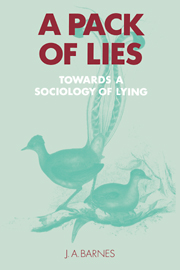Book contents
- Frontmatter
- Contents
- Preface
- Acknowledgments
- 1 What is a lie?
- 2 Where lies are expected
- 3 Ambiguous domains
- 4 Science
- 5 Cultural diversity
- 6 Relations
- 7 Self-deception and connivance in deceit
- 8 Telling and detecting lies
- 9 Benign untruths: the discourse of fiction
- 10 Evaluations
- 11 Do we have to have lies?
- References
- Index
10 - Evaluations
Published online by Cambridge University Press: 29 August 2009
- Frontmatter
- Contents
- Preface
- Acknowledgments
- 1 What is a lie?
- 2 Where lies are expected
- 3 Ambiguous domains
- 4 Science
- 5 Cultural diversity
- 6 Relations
- 7 Self-deception and connivance in deceit
- 8 Telling and detecting lies
- 9 Benign untruths: the discourse of fiction
- 10 Evaluations
- 11 Do we have to have lies?
- References
- Index
Summary
In this chapter I try to address two separate but related topics: the evaluation of lying in moral terms and the assessment of lying in sociological terms. The separateness of the topics is obvious; for centuries moralists have felt themselves able to write at length about the moral rights and moral wrongs (mainly the wrongs) of lying without saying much or anything at all about its sociological significance. The laity have been even less inclined to wait for sociologists to tell them whether they should condemn or applaud lying. Yet though the topics are distinct they are also related; the primary objective of sociological analysis, a better understanding of how the social world operates, should serve as a reliable stepping stone towards a second objective, the attainment of a social world which works better.
Although most philosophers and religious moralists have, for most of the time, condemned most lies as morally bad, this condemnation has varied considerably from one writer to another and from one kind of lie to another. As mentioned earlier, in antiquity Plato, who condemned the lies told by imaginative writers, discussed the rights and wrongs of what philosophers have called noble lies, told by the ruling elite to deceive the masses with the aim of preserving the social order (Bok 1978:165–170). Whether or not he approved of ‘noble lies’ is open to dispute (Arendt 1968:232, 298 n.5; cf. Bok 1978:305–306; Toynbee 1935:93; Voegelin 1957:104–108).
- Type
- Chapter
- Information
- A Pack of LiesTowards a Sociology of Lying, pp. 136 - 146Publisher: Cambridge University PressPrint publication year: 1994



